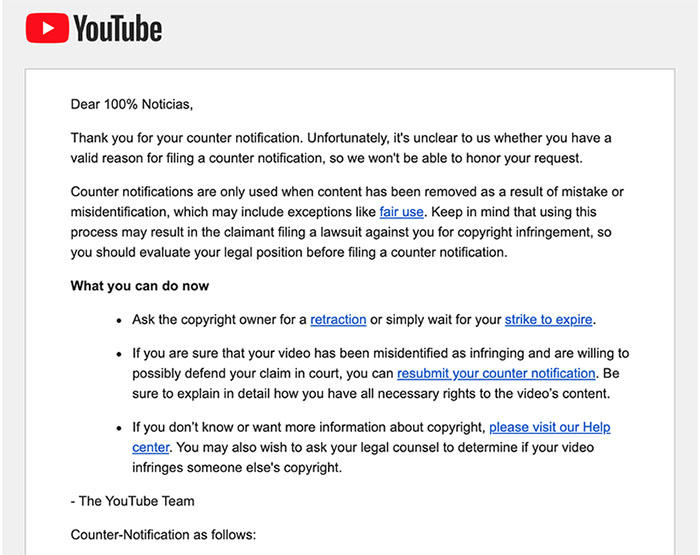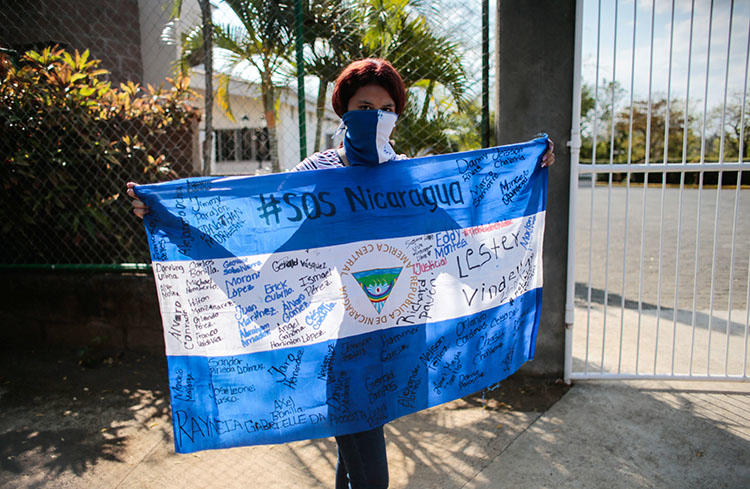Miguel Mora, director of the independent Nicaraguan news outlet 100% Noticias, oversaw its move online after its television broadcast license was revoked by the government in April 2018. He and his colleagues transferred their archives onto two YouTube accounts and used them to continue documenting the government’s repressive response to escalating protests in the months that followed. On March 5, 2020, YouTube notified him that the accounts would be shut down following copyright complaints.
100% Noticias is not alone. Another Nicaraguan independent outlet, news website Confidencial, told CPJ that it has had to challenge copyright claims on YouTube in the past year. Complaints in both cases came from media companies owned by members of President Daniel Ortega’s family, and involved footage of presidential speeches that is released to select outlets and routinely rebroadcast by others as a matter of public interest.
Since April 2018, CPJ has documented a brutal crackdown on the media in Nicaragua that includes harassment, threats, surveillance, and imprisonment of journalists who report on protests and challenge the pro-government media narrative. Now, amid the COVID-19 pandemic–with the Ortega government facing criticism for failing to take action to stem the spread of the virus–independent information is more crucial than ever.
“Ortega and [Vice President Rosario] Murillo want to present an alternative reality, and having independent media like 100% Noticias shut down is crucial for their narrative,” Gioconda Belli, president of PEN Nicaragua and a well-known Nicaraguan writer, told CPJ.
YouTube shut down 100 NOTICIAS NICARAGUA and 100% Noticias, the two accounts run by the outlet, on March 10, Mora told CPJ via email, and as of late April both remained unavailable. Their physical backups are inaccessible because their newsroom remains in the possession of the government, according to news reports. Mora said the shutdown of the YouTube channels prevents the staff from accessing all of the outlet’s video archives, including images of government repression of protests from 2018 and 2019.
“By cancelling our channels, the Nicaraguan dictatorship eliminates evidence of crimes against humanity,” Mora said to CPJ via email. “The files on our YouTube channels are the only resources we have, because our physical material was confiscated.”
CPJ emailed Vice President Murillo for comment about these allegations but did not receive a reply. The Inter-American Commission of Human Rights has accused high-ranking officials of the Nicaraguan government of rights violations, including crimes against humanity, for leading the repression of protests in 2018 that allegedly included the use of excessive force, arbitrary detentions, and killings by police and armed pro-government groups.
Mora and the news director of 100% Noticias, Lucía Pineda Ubau, were imprisoned following a police raid on their Managua newsroom on December 21, 2018. They spent 172 days behind bars and were released under a controversial amnesty law in June 2019. In November, CPJ honored them with a 2019 International Press Freedom Award.
100% Noticias continues to publish new stories on its news website and its Facebook and Twitter accounts, but most of its video archive remains unavailable, Mora told CPJ.
In notifications seen by CPJ, YouTube said the shutdowns followed 44 copyright complaints issued by Nicaraguan TV news channel Canal 4 for use of images and video footage in 44 videos dating from between 2013 and 2015. Canal 4 is owned by the family of President Ortega and run by his sons Daniel Edmundo and Tino, according to investigative reports by Nicaraguan outlets.
Mora told CPJ that the material referenced in the complaints involves Ortega’s speeches, which the government obliges all television channels to broadcast under Nicaragua’s telecommunications law, as well as some images of official government videos of social programs that they were authorized to use by Canal 4. But Canal 4 gave verbal authorization to use the footage, he said, before filing the complaints without advance warning this March.
Mora told CPJ via email, “100% Noticias used parts of [Canal 4’s] content that was about public administration to make our own news reports,” adding that Canal 4 gave verbal permission. “The other material they are claiming is about Ortega’s speeches that we were obliged to transmit. They force us to transmit their content and then claim copyright.”
Mora told CPJ that the content was broadcast in the public interest, and constituted fair use.
YouTube is obligated to comply with copyright claims under the Digital Millennium Copyright Act (DMCA), a 1998 U.S. law that requires intermediaries to immediately respond to a notice of copyright infringement by taking down the relevant content, without requiring an evaluation of user claims of, for example, fair use, according to a CPJ review of the law and legal analyses. If the company fails to do so, it can lose its immunity for copyright liability.
This requirement also allows users to contest the takedown. The email that YouTube sends to notify users includes a link to file a “counter notice” and claim, for example, fair use. However, when 100% Noticias attempted to file a counter notice addressing fair use as advised by YouTube during the writing of this article, they received a notification that it could not be processed.

“Our copyright removals process aims to strike a balance between making it easy and efficient for rightsholders to report infringing content while also protecting free expression on the web. This system has been effective at significantly reducing access to infringing content,” a YouTube spokesperson, who declined to be named due to company policy, told CPJ in an email. “At the same time, we actively fight against abuse from bad actors who try to limit access to information through censorship. In addition to providing channels with avenues to dispute copyright claims and submit counter notifications, we also employ proactive methods to root out abuse.”
YouTube said it had flagged the 100% Noticias case for its review team but did not respond to questions about who made the copyright complaint or whether this incident would be considered an abuse of the system by the Nicaraguan government, saying that they were unable to comment on specific governments or cases.
CPJ emailed Canal 4 via the contact information available on its website, but did not receive a response. CPJ was unable to locate any other contact information for the outlet. CPJ contacted Jose Miguel Fonseca, news director of Canal 4, on Twitter for comment, but did not receive a response.
In June 2019, Canal 13, another channel owned by the Ortega family, filed copyright complaints in relation to images of Ortega’s speeches that were used in a Confidencial video broadcast on YouTube, Elmer Rivas, an audiovisual producer for the outlet, told CPJ via phone in March.
Rivas said that only pro-government media are allowed to attend state events. Independent media are often banned from covering these events, and government officials do not grant them interviews, according to the Knight Center for Journalism in the Americas. Independent outlets are only allowed to use video from public events at the discretion of the outlets cleared to cover them, Rivas told CPJ.
“If they [pro-government media] publish video of something that should be public—for example, the president’s speeches—they do it as if it were a private production,” Rivas said. “If someone uses those images, they claim it as theirs.”
Rivas said Confidencial took the video down, and the incident was resolved in a matter of days, though YouTube required the outlet’s staff to complete its online course for first-time copyright offenders in order to be able to upload content.
However, Rivas said that the complaint was clearly an attempt at censorship.
“This is a political attack,” he said. “Censorship goes from the physical sphere, where they don’t let us in to the public events, to the digital, where they want to take us off YouTube.”
CPJ emailed Canal 13 for comment but did not receive a response. CPJ also asked YouTube about the incident involving the complaint filed against Confidencial, but received no additional information beyond the emailed statement.
CPJ has documented the harassment of several Confidencial journalists, including director Carlos Fernando Chamorro, who was forced into exile due to death threats in early 2019. The newsroom was raided in December 2018, CPJ documented, and police continue to occupy it, according to Confidencial.
Amid criticism of the Ortega government’s failure to respond to the COVID-19 pandemic, PEN’s Belli says that these attempts to censor independent media outlets represent a threat to Nicaraguans’ right to get proper information about the crisis. “The government wants to isolate Nicaragua so that only their version of events appears in the world,” Belli said.
Courtney C. Radsch, CPJ advocacy director, contributed reporting.
